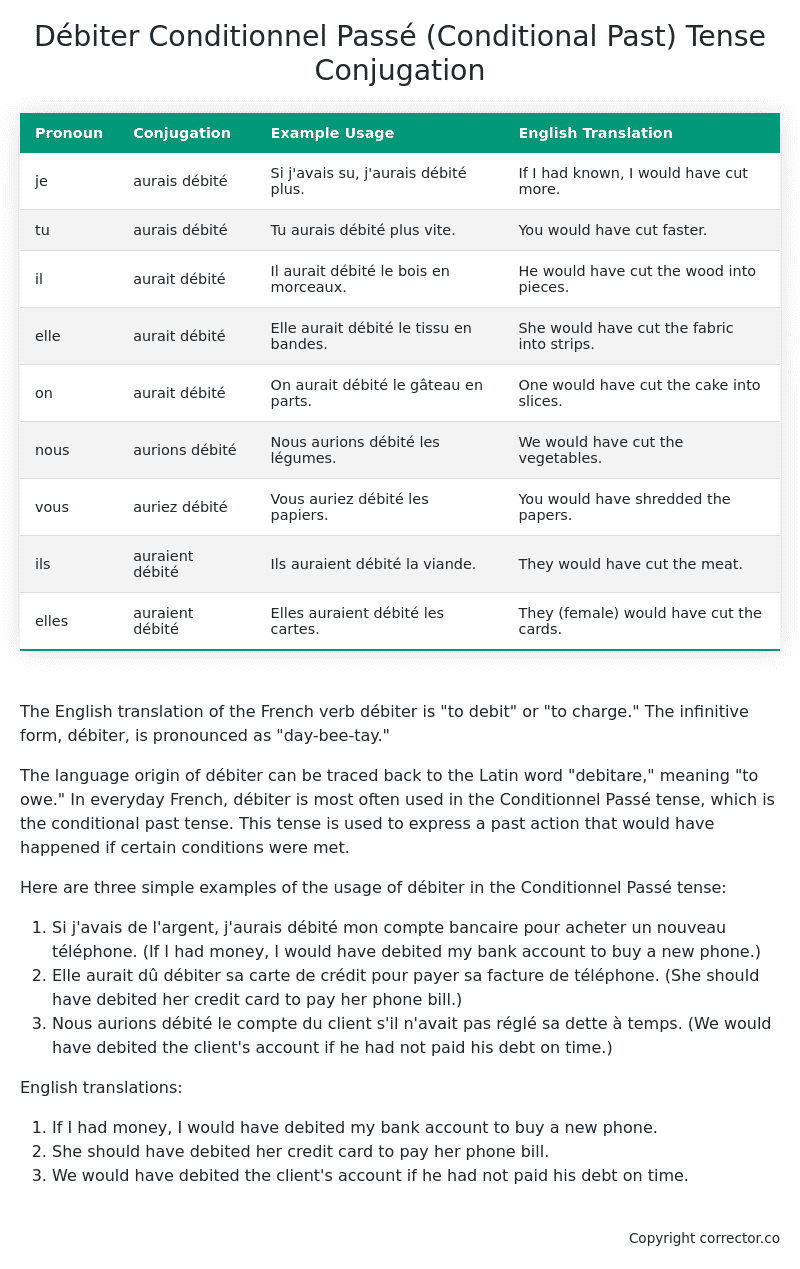Conditionnel Passé (Conditional Past) Tense Conjugation of the French Verb débiter
Introduction to the verb débiter
The English translation of the French verb débiter is “to debit” or “to charge.” The infinitive form, débiter, is pronounced as “day-bee-tay.”
The language origin of débiter can be traced back to the Latin word “debitare,” meaning “to owe.” In everyday French, débiter is most often used in the Conditionnel Passé tense, which is the conditional past tense. This tense is used to express a past action that would have happened if certain conditions were met.
Here are three simple examples of the usage of débiter in the Conditionnel Passé tense:
- Si j’avais de l’argent, j’aurais débité mon compte bancaire pour acheter un nouveau téléphone. (If I had money, I would have debited my bank account to buy a new phone.)
- Elle aurait dû débiter sa carte de crédit pour payer sa facture de téléphone. (She should have debited her credit card to pay her phone bill.)
- Nous aurions débité le compte du client s’il n’avait pas réglé sa dette à temps. (We would have debited the client’s account if he had not paid his debt on time.)
English translations:
- If I had money, I would have debited my bank account to buy a new phone.
- She should have debited her credit card to pay her phone bill.
- We would have debited the client’s account if he had not paid his debt on time.
Table of the Conditionnel Passé (Conditional Past) Tense Conjugation of débiter
| Pronoun | Conjugation | Example Usage | English Translation |
|---|---|---|---|
| je | aurais débité | Si j’avais su, j’aurais débité plus. | If I had known, I would have cut more. |
| tu | aurais débité | Tu aurais débité plus vite. | You would have cut faster. |
| il | aurait débité | Il aurait débité le bois en morceaux. | He would have cut the wood into pieces. |
| elle | aurait débité | Elle aurait débité le tissu en bandes. | She would have cut the fabric into strips. |
| on | aurait débité | On aurait débité le gâteau en parts. | One would have cut the cake into slices. |
| nous | aurions débité | Nous aurions débité les légumes. | We would have cut the vegetables. |
| vous | auriez débité | Vous auriez débité les papiers. | You would have shredded the papers. |
| ils | auraient débité | Ils auraient débité la viande. | They would have cut the meat. |
| elles | auraient débité | Elles auraient débité les cartes. | They (female) would have cut the cards. |
Other Conjugations for Débiter.
Le Present (Present Tense) Conjugation of the French Verb débiter
Imparfait (Imperfect) Tense Conjugation of the French Verb débiter
Passé Simple (Simple Past) Tense Conjugation of the French Verb débiter
Passé Composé (Present Perfect) Tense Conjugation of the French Verb débiter
Futur Simple (Simple Future) Tense Conjugation of the French Verb débiter
Futur Proche (Near Future) Tense Conjugation of the French Verb débiter
Plus-que-parfait (Pluperfect) Tense Conjugation of the French Verb débiter
Passé Antérieur (Past Anterior) Tense Conjugation of the French Verb débiter
Futur Antérieur (Future Anterior) Tense Conjugation of the French Verb débiter
Subjonctif Présent (Subjunctive Present) Tense Conjugation of the French Verb débiter
Subjonctif Passé (Subjunctive Past) Tense Conjugation of the French Verb débiter
Subjonctif Imparfait (Subjunctive Imperfect) Tense Conjugation of the French Verb débiter
Subjonctif Plus-que-parfait (Subjunctive Pluperfect) Tense Conjugation of the French Verb débiter
Conditionnel Présent (Conditional Present) Tense Conjugation of the French Verb débiter
Conditionnel Passé (Conditional Past) Tense Conjugation of the French Verb débiter (this article)
L’impératif Présent (Imperative Present) Tense Conjugation of the French Verb débiter
L’infinitif Présent (Infinitive Present) Tense Conjugation of the French Verb débiter
Struggling with French verbs or the language in general? Why not use our free French Grammar Checker – no registration required!
Get a FREE Download Study Sheet of this Conjugation 🔥
Simply right click the image below, click “save image” and get your free reference for the débiter Conditionnel Passé tense conjugation!

Débiter – About the French Conditionnel Passé (Conditional Past) Tense
Formation
Common Everyday Usage Patterns
Expressing Unreal Past Scenarios
Polite Requests or Suggestions
Expressing Doubt or Uncertainty
Interactions with Other Tenses
Conditional Present
Indicative Past Tenses
Conditional Future
Summary
Want More?
I hope you enjoyed this article on the verb débiter. Still in a learning mood? Check out another TOTALLY random French verb conjugation!


